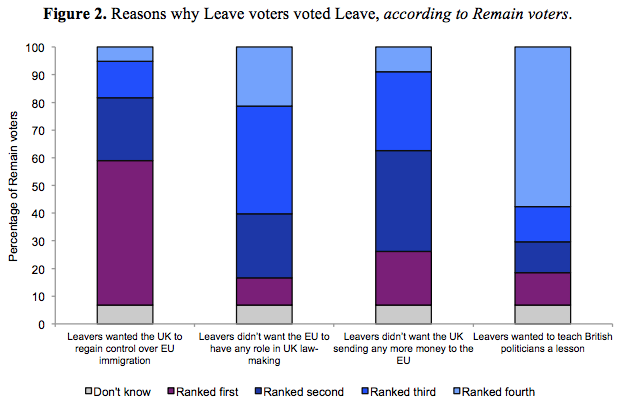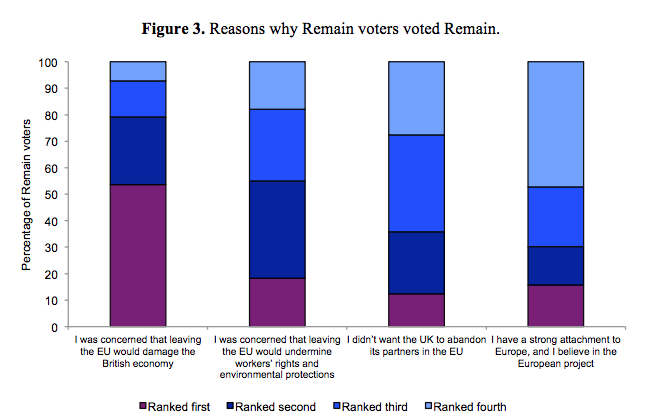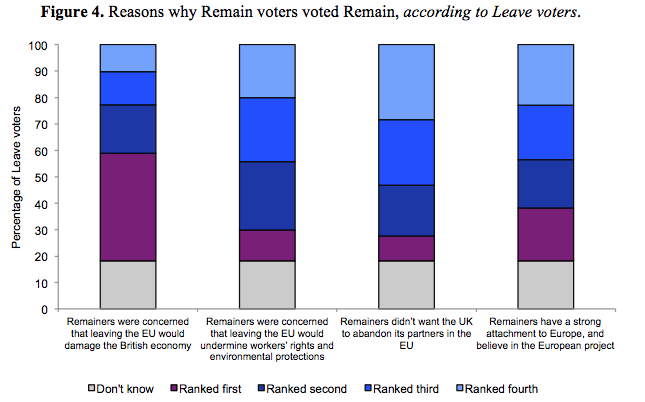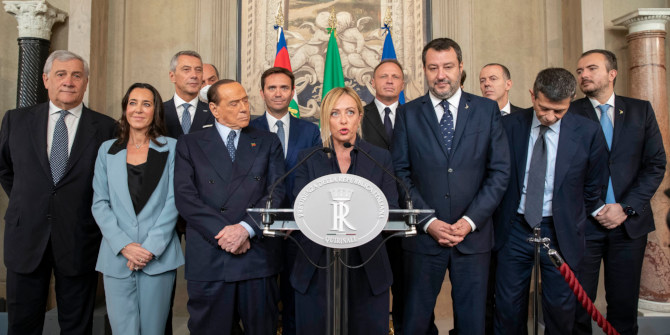 Why did people really vote to Leave or Remain? Noah Carl examines four different polls, and finds that immigration and sovereignty headed Leavers’ reasons – contrary to suggestions that the vote was intended to ‘teach politicians a lesson’. Leavers also proved better at characterising Remainers’ reasons than vice versa – something which may be linked to progressives’ greater tendency to disengage from their political opponents.
Why did people really vote to Leave or Remain? Noah Carl examines four different polls, and finds that immigration and sovereignty headed Leavers’ reasons – contrary to suggestions that the vote was intended to ‘teach politicians a lesson’. Leavers also proved better at characterising Remainers’ reasons than vice versa – something which may be linked to progressives’ greater tendency to disengage from their political opponents.
Three separate surveys/opinion polls conducted around the time of the referendum asked Britons why they voted the way they did. These all found more or less the same thing, namely that the two main reasons people voted Leave were ‘sovereignty’ and ‘immigration’, and that the main reason people voted Remain was ‘the economy’.

First, YouGov asked Leave and Remain voters to say which reason from a list of eight was the most important when deciding how to vote in the referendum. The most frequently selected reason among Leave voters – ticked by 45% – was ‘to strike a better balance between Britain’s right to act independently, and the appropriate level of co-operation with other countries’. The second most frequently selected reason among Leave voters – ticked by 26% – was ‘to help us deal better with the issue of immigration’. The most frequently cited reason among Remain voters – ticked by 40% – was ‘to be better for jobs, investment and the economy generally’. Interestingly, the second most frequently selected reason among Remain voters was the same as the most frequently selected reason among Leave voters (given above).
Second, Lord Ashcroft asked Leave voters to rank four possible reasons for voting Leave, and asked Remain voters to rank four possible reasons for voting Remain. The two most important reasons for voting Leave were: ‘The principle that decisions about the UK should be taken in the UK’, which was ranked first by 49% of Leave voters; and ‘A feeling that voting to leave the EU offered the best chance for the UK to regain control over immigration and its own borders’, which was ranked first by 33% of Leave voters. The two most important reasons for voting Remain were: ‘The risks of voting to leave looked too great when it came to things like the economy, jobs and prices’, which was ranked first by 43% of Remain voters; and ‘A vote to remain
would still mean the UK having access to the EU single market while remaining outside of the Euro and the no borders area of Europe, giving the UK the best of both worlds’, which was ranked first by 31% of Remain voters.
Third, the British Election Study team asked their respondents an open-ended question just prior to the referendum, namely ‘What matters most to you when deciding how to vote in the EU referendum?’. They coded the responses into 54 categories encompassing the key themes that respondents mentioned. The most frequently cited reasons for voting Leave were ‘Sovereignty/EU bureaucracy’ and ‘Immigration’ (both mentioned by around 30% of those who said they intended to vote Leave). By far the most frequently cited reason for voting Remain was ‘Economy’ (mentioned by nearly 40% of those who said they intended to vote Remain).
CSI’s data on why people voted Leave or Remain in the EU referendum
Approximately 3,000 respondents were surveyed online by the polling company Kantar between 2 February and 8 March, 2018. To begin with, we asked Leave voters to rank four reasons for voting Leave in order of how important they were when deciding which way to vote in the referendum. Figure 1 displays the distribution of Leave voters by rank for each of the four reasons. (Note that the wording of each reason is exactly as it appeared in the online survey.) The reason with the highest average rank is ‘to regain control over EU immigration’. The reason with the second highest average rank is ‘didn’t want the EU to have any role in UK law-making’.
Note: Each bar shows the distribution of Leave voters according to how they ranked the corresponding reason for voting Leave. Bars are ordered from left to right by the percentage-weighted mean rank. Sample weights were applied.
Interestingly, ‘to teach British politicians a lesson’ has by far the lowest average rank, being ranked last by a full 88% of Leave voters. This contradicts the widespread claim that Brexit was a ‘protest vote’: i.e., that people voted Leave as a way of venting deep-seated grievances about things such as inequality, austerity and social liberalism, rather than because they opposed Britain’s membership of the EU per se.
We then asked Remain voters to rank the same four reasons in order of how important they thought those reasons were to Leave voters. (When answering this question, Remain voters were given the option to say ‘don’t know’.) Figure 2 displays Remainers’ assessments of Leavers’ reasons for voting Leave. It shows that Remain voters overestimate the importance that Leave voters attach to both regaining control over EU immigration and teaching British politicians a lesson. 52% of Remain voters rank ‘Leavers wanted the UK to regain control over EU immigration’ first, whereas only 39% of Leave voters rank ‘to regain control over EU immigration’ first. And 12% of Remain voters rank ‘Leavers wanted to teach British politicians a lesson’ first, whereas only 3% of Leave voters rank ‘to teach British politicians a lesson’ first. By contrast, Remain voters dramatically underestimate the importance that Leave voters attach to the EU having no role in UK law-making. Only 10% of Remain voters rank ‘Leavers didn’t want the EU to have any role in UK law-making’ first, whereas 35% of Leave voters rank ‘didn’t want the EU to have any role in UK law-making’ first.
Note: Each bar shows the distribution of Remain voters according to how they ranked the corresponding reason for voting Leave. Sample weights were applied.
We also asked Remain voters to rank four reasons for voting Remain in order of how important they were when deciding which way to vote in the referendum. Figure 3 displays the distribution of Remain voters by rank for each of the four reasons. Unsurprisingly, ‘leaving the EU would damage the British economy’ has by far the highest average rank, being ranked first by a full 54% of Remain voters. More interestingly, the reason with the lowest average rank is ‘a strong attachment to Europe’, which comports with the claim that Britons have a relatively weak sense of European identity.
Note: Each bar shows the distribution of Remain voters according to how they ranked the corresponding reason for voting Remain. Bars are ordered from left to right by the percentage-weighted mean rank. Sample weights were applied.
As before, we then asked Leave voters to rank the same four reasons in order of how important they thought those reasons were to Remain voters. Figure 4 displays Leavers’ assessments of Remainers’ reasons for voting Remain. It shows that Leave voters slightly overestimate the importance that Remain voters attach to Europe and the European project. 20% of Leave voters rank ‘Remainers have a strong attachment to Europe, and believe in the European project’ first, whereas only 16% of Remain voters rank ‘a strong attachment to Europe’ first.
Note: Each bar shows the distribution of Leave voters according to how they ranked the corresponding reason for voting Remain. Sample weights were applied.
Overall, however, Leave voters characterise Remain voters more accurately than Remain voters characterise Leave voters (despite the fact that Leave voters were more likely to say ‘don’t know’). This is apparent just by visually comparing Figures 1 and 2 versus Figures 3 and 4. However, to check more precisely, I calculated the sum of the absolute differences between the percentages in the various segments of the Figures, for each of the two pairs. The discrepancies between Figures 1 and 2 summed to 173 percentage points. By contrast, the discrepancies between Figures 3 and 4 summed to only 101 percentage points. This finding is consistent with evidence from the United States that conservatives hold more accurate stereotypes about progressives than progressives do about conservatives.
Why then do Leave voters characterise Remain voters more accurately than Remain voters characterise Leave voters? Two possible explanations are as follows. First, according to several reports on media coverage of the referendum campaign, the ‘economy’ was the most frequently mentioned issue, and ‘immigration’ was mentioned far more often than ‘sovereignty’. Given that many partisans on both sides will have been exposed to their opponents’ arguments primarily via the popular media, this may explain why Remain voters underestimate the importance that Leave voters attach to the EU having no role in UK law-making (i.e., sovereignty). On the other hand, when David Levy and colleagues analysed media coverage at the level of individual arguments, they found that Leave campaigners actually mentioned ‘sovereignty’ more often than ‘immigration’. Second, there is a certain amount of evidence that progressives are more likely to block or ‘unfriend’ their ideological counterparts than conservatives. For example, a 2014 YouGov poll found that 42% of Liberal Democrat supporters said they would find it harder to be friends with someone who became a UKIP supporter, whereas only 10% of UKIP supporters said they would find it harder to be friends with someone who became a Liberal Democrat supporter. For this reason, Remain voters may have had less exposure to Leave voters’ arguments than vice versa.
An important methodological caveat is that the data presented here concern people’s stated reasons for voting Leave or Remain, assessed more than 18 months after the referendum took place. It is therefore possible that they do not reflect the true reasons people voted the way they did. For example, they could be biased by the tendency for people to justify their decisions with post-hoc rationalisations. On the other hand, Figures 1 and 3 accord rather closely with the findings of previous surveys and opinion polls.
Please read our comments policy before commenting.
Note: This post is an edited version of CSI Brexit 4: People’s Stated Reasons for Voting Leave or Remain, April 2018, where full references can be found. It originally appeared at our sister site, LSE Brexit. The article gives the views of the author, not the position of EUROPP – European Politics and Policy or the London School of Economics.
_________________________________
 Noah Carl – Centre for Social Investigation
Noah Carl – Centre for Social Investigation
Noah Carl is a post-doctoral researcher at the Centre for Social Investigation.









This would correlate well with Jonathan Haidt’s principle contention in the Righteous Mind.
Do you believe there is a link?
From my perspective this is a straw man argument. I have friends who voted Leave who are not remotely stupid enough to have done so merely as a protest vote. I believe, however, that they were misled over many years by the lies of Boris Johnson and others, who by harping on about straight bananas, lack of democracy and the like laid the ground for other actors – state actors, I believe – to use the opportunity provided by the 2016 referendum to sow dissension and discord. is there anyone, I wonder, who has failed to note the coincidence of really unwise political decisions in the UK and USA, Russia’s chief antagonists in the West? Is it possible to observe the growing body of evidence that the appalling Donald Trump was assisted by Russian money and activities, without having the slightest suspicion that the same sort of thing has been going on here?
I would contend that the real misunderstanding of motivation has been by the Leave camp in respect of those who wish to remain. Government warnings of likely consequences of Brexit were gaily dismissed as “Project Fear”; look around you now and ask yourself whether fear-mongering was indeed the prime motivation. I suggest that the motivation of most of us on the Remain side is quite simply the welfare of the nation. We do not see how Brexit can resolve the problems associated with the Irish border – those of us of a certain age remember the Troubles only too clearly, and are unimpressed by Rees-Mogg’s contention that he has nothing to learn on the subject by visiting Ireland. We have no wish to lose Scotland from the Unon, particularly only a few years after Scotland voted positively to remain in it. And we are naturally unimpressed by the hand-waving arguments, now being shown up in their falsehood, that it will all be alright really, that we do not need the EU in order to form advantageous trading partnerships around the world. We discussed this in 1973, and concluded that our Commonwelath partnerships were no longer sufficient. We need the EU, and the EU needs the UK to remain part of it. Problems within the EU need to be fixed from within, not by stomping off in a huff.
Brexit is a great foolishness, and can only damage Britain by continuing and worsening the mistrust to which we are treated by those whose interests most closely correspond with ours, namely the countries of Europe, particularly Western Europe. The only nation in the world whose interests are served by Brexit is Russia.